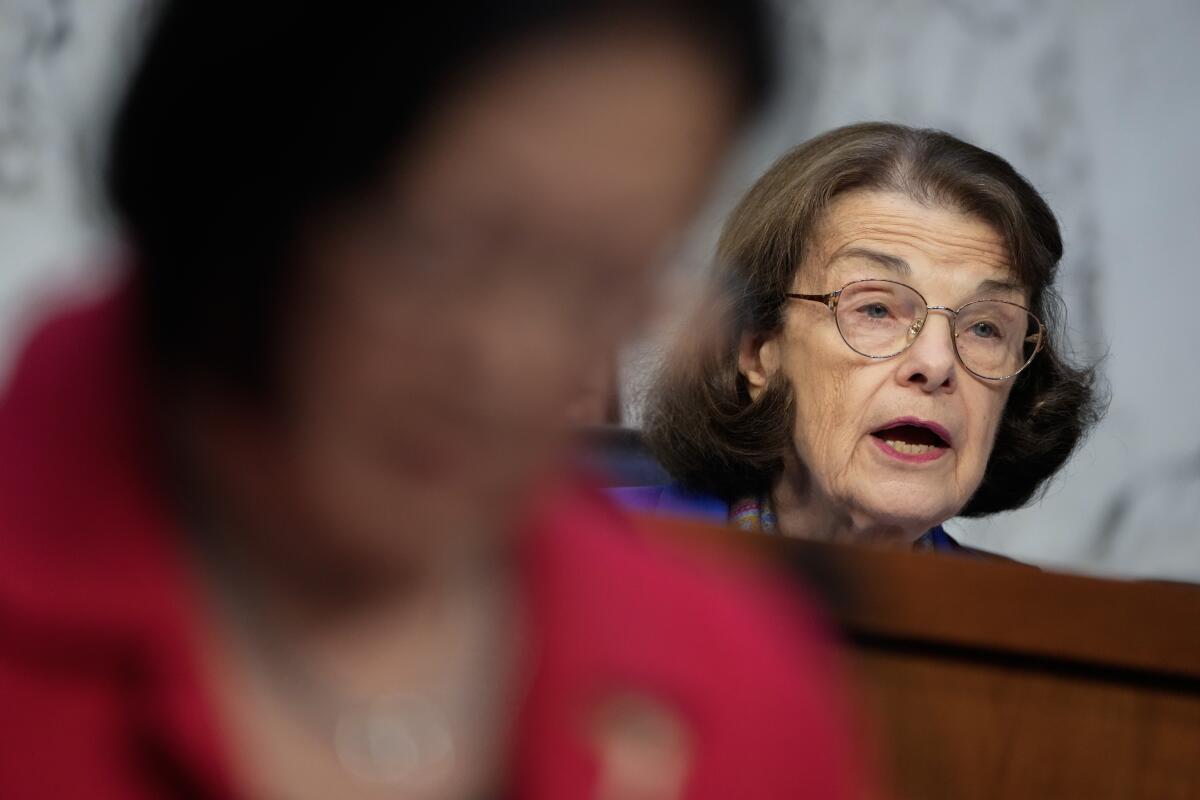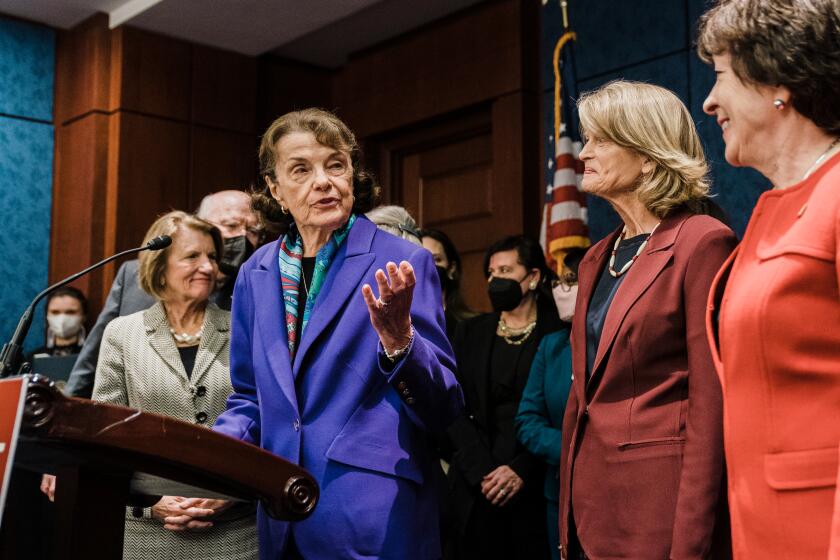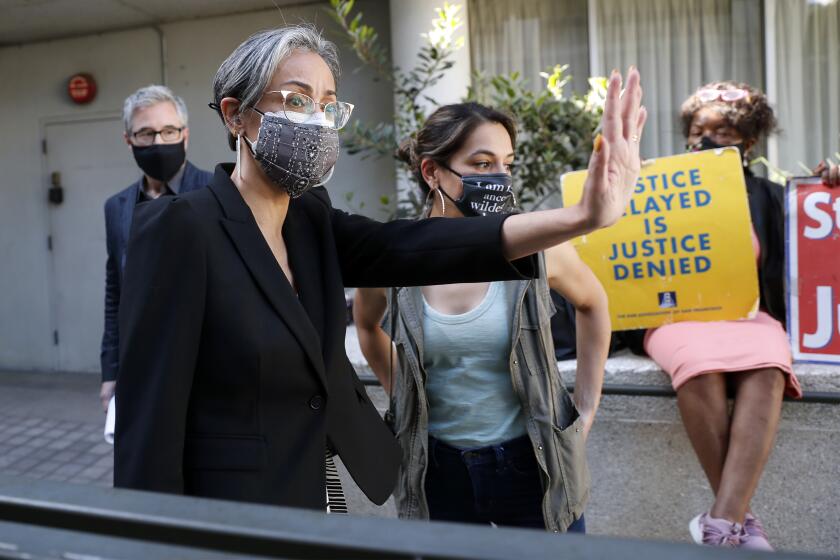Column: Stop hounding Dianne Feinstein and let her finish her time in the Senate

When Dianne Feinstein showed up last week for the mud-heaving spectacle that served as the Senate’s vetting of Supreme Court nominee Ketanji Brown Jackson, several notable things did not happen.
The California Democrat did not wield the gavel as chair of the Judiciary Committee, as her seniority might have allowed.
She did not hug Lindsey Graham, the preternaturally worked-up Republican senator from South Carolina.
She did not lose control of her motor skills, confuse Jackson for, say, Associate Justice Amy Coney Barrett, or launch into a hazy reverie about that time as San Francisco mayor she and Tony Bennett welcomed the cable cars back to the city.
In short, Feinstein was not the doddering, half-there husk of her old self that some, eager for the 88-year-old senator to stand aside, suggest she’s become.
True, that’s not a high bar to evaluate her performance as senior senator from the wealthiest, most populous, most diverse, most bounteous, most cutting-edge, blah-blah-blah state in the country.
But it’s reason enough to stop hounding Feinstein to leave office and bestow on one individual, Gov. Gavin Newsom, the power to unilaterally choose both U.S. senators for 40 million Californians.
Sen. Dianne Feinstein gets the lowest approval rating of her career in the latest Los Angeles Times/Berkeley IGS poll. President Biden and Vice President Kamala Harris also fail to get strong approval in an overwhelmingly Democratic state.
There’s no question Feinstein is no longer the political force she once was.
The widely admired pathbreaker who opened avenues for women in politics and the steely-spined lawmaker who took on the National Rifle Assn. to pass an assault weapons ban was nowhere to be seen at last week’s confirmation hearing.
But that’s not new. It isn’t as though Feinstein was some dewy 18-year-old when voters reelected her for a fifth time in 2018.
She subsequently drew scathing criticism from Democrats for her handling, as ranking member of the Judiciary Committee, of the confirmation hearings for Supreme Court nominees Brett M. Kavanaugh and Barrett. It was following the latter that Feinstein famously and infamously hugged Graham and praised his handling of Barrett’s hurried-up installation on the high court.
After Democrats won back control of the Senate, Feinstein bowed to pressure and ceded the chairmanship to Illinois Democrat Richard J. Durbin, who, at age 77, is hardly in the first blush of youth. (Feinstein’s fig-leaf explanation was a need to spend more time focusing on “two existential threats” to California, wildfire and drought.)
Though she gave up the gavel, Feinstein remains a member of the committee. When it came her turn last week to question Jackson, she stuck closely to remarks prepared in advance, as though fearing the damage she might do veering off script. But her delivery was natural and voice firm.
She was clearly attentive and engaged, though perhaps not in the way she once was. It’s hard to see the Feinstein of old ignoring a dig that Graham worked in during his inquisition of Jackson, when he mockingly referred to Feinstein’s questioning of Barrett about her religious faith.
But there are worse things than not stooping to engage with a troll; overall, the hearings would have been vastly improved had there been less time spent settling old scores.
The ouster of San Francisco school board members over COVID-19 issues bodes poorly for Democrats come November.
Feinstein is a throwback to an earlier era in politics. As her biographer, Jerry Roberts, has noted she is neither strongly ideological nor performative, both of which are considered these days as major qualifications for a career, if not a record of high achievement, in Congress.
That, as much as her age, is a reason why some — particularly on the far left — would like to see Feinstein go and someone more liberal and theatric take her place.
However, while that may be viscerally pleasing, the practical effect wouldn’t be all that great.
Anyone Newsom appointed would almost surely vote the same as Feinstein close to 100% of the time. That person might have different priorities and would certainly bring a different set of lived experiences. But it’s not as though Feinstein has stopped doing her job as senator.
Last week, the Senate passed a bipartisan bill Feinstein co-sponsored expanding scientific and medical research into marijuana. Her offices in Washington and throughout the state keep tending to constituents, so it’s not as though Californians can’t get the help they pay for.
Like a lot of people who reach a certain age, Feinstein has good and bad days. She relies heavily on her staff, though the same can be said about many members of Congress.
None of that suggests Feinstein should hang on indefinitely. If she can no longer function in the Senate, she should resign for the good of the state and let Newsom name a successor. (The governor’s pick to replace Vice President Kamala Harris, former Secretary of State Alex Padilla, took office in January 2021 and is running this year for a full six-year term.)
Feinstein, who recently lost her husband, Dick Blum, is up for reelection in 2024. If she chooses — unwisely — to run yet again at age 91, voters will have a chance to usher her into retirement.
Meantime, California won’t break off and drift to sea simply because someone younger, louder and more belligerent isn’t holding one of its two Senate seats. Let Feinstein keep at it and finish her term. And quit all the carping about her being too old and out of it.
More to Read
Get the latest from Mark Z. Barabak
Focusing on politics out West, from the Golden Gate to the U.S. Capitol.
You may occasionally receive promotional content from the Los Angeles Times.













